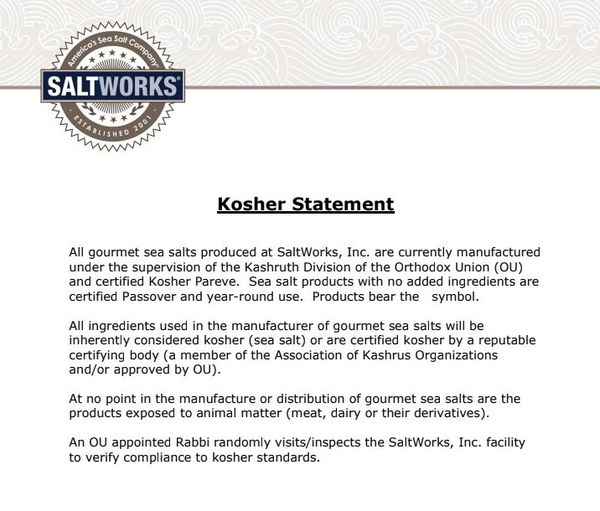Author: Nathaniel Slattery
Posted: 3rd Day of Sacred Heart, Year of Our Lord 2024

- Pictured is the typical salt which you buy. Below is the salt which you ought to buy. Below that is the explanation why: “Hello Nathaniel, I can assure you that the SoSalt Brand that packs my salt in Sicilia is NOT blest by a Rabbi nor does it conform to Kosher requirements. I do not carry any coarse versions anymore due to low sales, so all I can sell you is the fine. I respect all people of faith, and I mean no disrespect by asking this question. Would you please share with me what religion you are a part of that would have a requirement that ingredients cannot be blessed by any other religions? I’m just curious to learn. My father studied religion and growing up I had quite the eclectic knowledge of various religions. Best Regards, Evan Brady Craft Butchers’ Pantry Owner / Salumiere Web: www.butcherspantry.com”
- When you google the question: “How can I buy non-kosher salt?” Google will return only answers that seem to respond to the question: “What is kosher salt?” When you ask that question, you get three answers: 1) It is a type of salt defined by grain which draws out blood from meat so that a certain religion may eat it. Followup questions: Why is all salt in America this one particular type? How is this determined? Have you ever prepared meat? Have you ever read the Old Testament? In there is described the way of removing blood from meat from time immemorial: cut the throat and drain the blood. Researching butchery intensely, I have seen nobody say that the primary use of salt is for drawing out blood from meat.
- Second answer: Kosher means that it has been certified by a body as such. Followup questions: What sort of body? Where does it derive its authority? How does it receive funding? Is it associated with the religion commonly thought of when the word “kosher” is mentioned? Does that mean that the money I spend on salt (a universal ingredient required by all animal life on earth), goes to fund this religion (which is boldly and blasphemously opposed to the religion of me, my children, and all my people)?
- Third answer: It is blessed by a rabbi. This comes from what salt companies have specifically told me. How do I know which answer applies? If I cannot know what exactly might be meant by the word “kosher”, the first answer being negligible, the second being worrisome, and the third being outright dangerous to my soul, then should I not avoid it completely? Should I drink water if there is a one in three chance of it containing cyanide? Should I give it to my children?
- Furthermore, applying the discursive method, let us acknowledge what is plain to the senses: the word “kosher” has a specific reference to a specific religion, and everyone knows this. It does not occur in any other context in the speech of my people or of any other people even closely related to my nation. Rather, it derives from an extremely small group of people who, moreover, are understood to have great power, wealth, and influence, disproportionate to their size. This small group of people is defined by a religion that teaches very blasphemous things about the God which I worship and hope my children will worship, named Jesus Christ. Finally, looking at similar wording, if the word “Catholic” was used to describe salt, then everyone would assume that this salt is related specifically to that Church, that it would be evaluated by a member of that Church, which most naturally would be a priest. Where the word “blessed” is used in relation to salt, this is common knowledge to be the case. Where the word “halal” is used, it is also common knowledge to be the case, and this is an example of a very foreign word related also to a religion. Therefore, the most logical conclusion is that the second answer is nearly guaranteed, and the third answer is a strong possibility on top of that.

